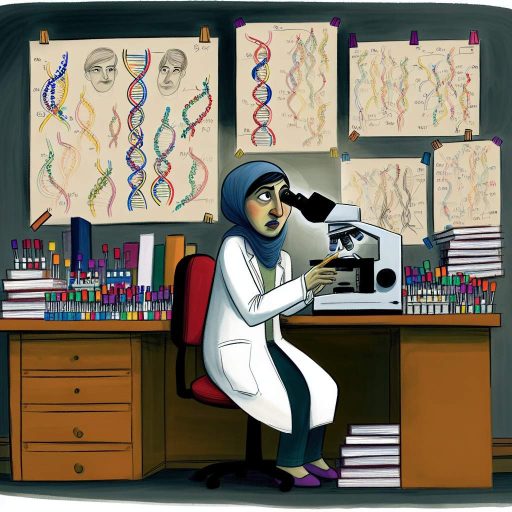Introduction to the Biotech Sector
The biotech sector has rapidly gained importance in modern science.
This field focuses on using biological systems and organisms for innovation.
Biotechnology addresses significant challenges in health, agriculture, and the environment.
In recent years, advancements in genetic research have transformed this industry.
Consequently, the demand for skilled geneticists has significantly increased.
The Role of Geneticists in Biotechnology
Geneticists play a crucial role in understanding DNA and genetic makeup.
They analyze genetic disorders to develop targeted therapies.
Moreover, geneticists contribute to advancements in personalized medicine.
Through gene editing techniques, they enhance crop resistance.
This results in increased food security and sustainability.
Current Trends in the Biotech Sector
The biotech sector experiences continuous growth driven by innovation.
Notably, the rise of CRISPR technology has revolutionized genetic editing.
Advancements in genomics have made significant contributions to research.
Furthermore, collaborations between academia and industry are accelerating discoveries.
These trends highlight the increasing reliance on geneticists in biotech firms.
Future Prospects for Geneticists
The career outlook for geneticists remains promising and dynamic.
As biotechnology evolves, new career opportunities emerge in various sectors.
Geneticists will increasingly work on environmental biotechnology initiatives.
Additionally, they will play key roles in the pharmaceutical industry.
Investing in education and training will be essential for aspiring geneticists.
Overview of Genetics and the Role of Geneticists in Biotechnology
Understanding Genetics
Genetics is the study of heredity and variation in organisms.
It explores how traits are transmitted from parents to offspring.
Furthermore, genetics plays a crucial role in many biological processes.
This field helps in understanding diseases and developing medical treatments.
The Importance of Geneticists
Geneticists are scientists who specialize in genetics.
Unlock Your Career Potential
Visualize a clear path to success with our tailored Career Consulting service. Personalized insights in just 1-3 days.
Get StartedThey investigate the structure and function of genes.
Additionally, they study the interaction between genes and the environment.
Geneticists utilize their knowledge to develop biotechnology solutions.
These solutions often contribute to advances in medicine and agriculture.
Geneticists in Biotechnology
The biotech sector increasingly relies on geneticists.
They play essential roles in genetic engineering and cloning.
Moreover, geneticists work on creating genetically modified organisms.
These organisms can possess advantageous traits compared to their natural counterparts.
The Growing Demand for Geneticists
The demand for geneticists in biotechnology is on the rise.
As technologies advance, companies seek skilled professionals in this field.
Furthermore, geneticists help drive innovation in various sectors.
They address challenges such as food security and disease prevention.
Consequently, educational institutions are increasing genetic studies.
Future Perspectives
The future for geneticists in biotechnology looks promising.
Emerging fields such as synthetic biology are expanding rapidly.
Additionally, advancements in CRISPR technology highlight the need for expertise.
Geneticists will continue to be vital for scientific progress.
Their work will shape the future of healthcare and agriculture.
Factors Driving the Demand for Geneticists in the Biotech Industry
Advancements in Genetic Research
Recent breakthroughs in genetic research are fueling the need for skilled professionals.
These advancements lead to innovative therapies and treatments.
Consequently, biotech companies seek geneticists to harness these findings.
Growth of Precision Medicine
Precision medicine focuses on personalized treatment plans for patients.
This approach relies heavily on genetic information and analysis.
As a result, the demand for geneticists in this field continues to rise.
Increased Awareness of Genetic Testing
Public interest in genetic testing has surged in recent years.
More individuals are seeking insights through genetic screening.
This trend drives biotech companies to hire geneticists for testing services.
Biotechnology Startups and Innovation
The thriving startup culture in biotechnology creates new opportunities.
Many startups focus on genomics, requiring specialized expertise.
Thus, geneticists play a critical role in these innovative ventures.
Regulatory and Compliance Needs
Stringent regulations govern genetic research and testing practices.
Biotech companies must comply with these legal frameworks.
Consequently, they need geneticists to ensure compliance and quality control.
Collaboration with Other Disciplines
Genetics increasingly intersects with various scientific fields.
Geneticists collaborate with engineers, data scientists, and clinicians.
This interdisciplinary approach enhances research outcomes.
As a result, the demand for geneticists continues to grow.
Educational and Research Institutions’ Influence
Universities and research institutions are expanding their genetics programs.
They are producing a skilled workforce equipped for biotech careers.
This influx of trained geneticists supports the industry’s expanding needs.
You Might Also Like: How Geneticists Contribute to Solving Global Health Issues
Key Areas Where Geneticists Are Making an Impact
Pharmaceuticals
Geneticists play a crucial role in drug development.
They help identify genetic markers for diseases.
This process allows for personalized medicine approaches.
As a result, treatments can be tailored to individual genetic profiles.
Moreover, geneticists contribute to gene therapy innovations.
These therapies aim to correct genetic disorders at their source.
Consequently, this field is rapidly advancing, increasing the demand for skilled geneticists.
Companies like Genentech and Amgen have expanded their genetic research teams.
Agriculture
In agriculture, geneticists enhance crop yields through genetic modification.
They develop plants resistant to pests and diseases.
This innovation can reduce the need for chemical pesticides.
Furthermore, geneticists work on drought-resistant varieties.
This attribute is essential as climate change impacts water availability.
Additionally, geneticists focus on improving nutritional content in crops.
Companies such as Monsanto and DuPont Pioneer are at the forefront of this research.
Diagnostics
Geneticists are pivotal in the field of diagnostics.
They develop tests that quickly identify genetic disorders.
These tests enable early detection and management of diseases.
Moreover, advancements in sequencing technologies have revolutionized diagnostics.
Now, next-generation sequencing offers rapid results with high accuracy.
Organizations like Illumina and Thermo Fisher Scientific lead this space.
The demand for geneticists in diagnostics continues to grow as technologies advance.
Gain More Insights: Impact of Ecologists on Conservation and Biodiversity
The Skills and Qualifications Needed to Become a Geneticist in Biotech
Educational Background
A solid educational foundation is crucial for aspiring geneticists.
Most positions require at least a bachelor’s degree in genetics or a related field.
Advanced degrees, such as a master’s or Ph.D., are often preferred.
Courses in molecular biology and biochemistry are particularly beneficial.
Essential Skills
Strong analytical skills are vital for success in genetics.
A geneticist must interpret complex data and identify patterns.
Attention to detail is equally important for accurate results.
Effective communication skills enhance collaboration in research teams.
Furthermore, technical skills in laboratory techniques are necessary.
Hands-on Experience
Practical experience greatly enhances a candidate’s job prospects.
Internships or research assistant positions provide valuable exposure.
Involvement in university labs can also foster essential skills.
Moreover, attending workshops improves specialized knowledge.
Certifications and Licenses
Some positions may require specific certifications for geneticists.
Certification from professional organizations can enhance credibility.
Additionally, staying updated on industry standards is essential.
Continued Professional Development
Genetics is a rapidly evolving field, so ongoing education is crucial.
Participating in conferences can keep you informed about new research.
Joining professional associations provides networking opportunities.
Regularly reading scientific journals sharpens your expertise.
Explore Further: Exploring Wildlife Biologist Salaries in Canada

Career Paths and Opportunities for Geneticists in the Biotech Sector
Opportunities in Research and Development
Geneticists play a vital role in research and development in biotech companies.
They focus on genetic engineering, genetic analysis, and biomolecular research.
Moreover, they contribute to developing novel therapies and treatments.
Research positions often require collaboration with multidisciplinary teams.
This teamwork fosters innovation and accelerates product development.
Positions in Quality Control and Assurance
Quality control and assurance roles are crucial in the biotechnology sector.
Geneticists ensure that products meet regulatory standards and specifications.
They conduct tests to confirm the efficacy and safety of new drugs.
Attention to detail is essential for maintaining high-quality standards.
Careers in Regulatory Affairs
Regulatory affairs is another promising path for geneticists.
This role involves navigating complex regulatory environments.
Geneticists in this field ensure compliance with laws and guidelines.
They prepare documentation for regulatory submissions and approvals.
Paths in Clinical Research
Clinical research offers exciting opportunities for geneticists.
They often work directly with patient data to assess treatment outcomes.
This position requires strong analytical and problem-solving skills.
Geneticists help design clinical trials to evaluate new products.
Additionally, they analyze genetic markers for disease predisposition.
Academic and Teaching Roles
A career in academia is also viable for many geneticists.
Teaching at universities allows them to share their knowledge.
They train the next generation of scientists and researchers.
Moreover, they contribute to academic research and publications.
Entrepreneurship and Startups
Finally, entrepreneurial ventures are an option for adventurous geneticists.
Many choose to start their own companies in the biotech field.
This path often leads to innovative solutions and products.
Entrepreneurs utilize their expertise to address unmet needs in healthcare.
Discover More: Popular Geology Specializations and Career Paths
Case Studies Showcasing Successful Genetic Applications in Biotech Companies
Case Study: GeneThera Innovations
GeneThera Innovations has made significant strides in genetic research.
They developed a revolutionary gene therapy for inherited retinal diseases.
This breakthrough allows patients with genetic vision loss to regain sight.
Furthermore, it demonstrates the potential of geneticists in patient-focused biotech solutions.
Case Study: BioGenomics Solutions
BioGenomics Solutions specializes in agricultural biotechnology.
They successfully engineered drought-resistant crops through genetic modification.
This innovation helps farmers cope with climate change challenges.
Moreover, it ensures food security in vulnerable regions worldwide.
Case Study: Helix BioScience
Helix BioScience focuses on advanced genetic testing services.
They offer personalized medicine based on an individual’s genetic makeup.
This personalized approach enhances treatment effectiveness and minimizes side effects.
Additionally, their success underscores the growing need for skilled geneticists.
Case Study: SeedGen Tech
SeedGen Tech is pioneering genetic techniques in crop improvement.
They utilize CRISPR technology to enhance nutrient profiles in plants.
This advancement not only increases yield but also boosts health benefits.
Consequently, it showcases the vital role geneticists play in sustainable agriculture.
Case Study: MedicaGen Therapeutics
MedicaGen Therapeutics is leading the charge in gene editing therapies.
They have developed a tool for precise modifications of the genome.
This tool has facilitated breakthroughs in cancer treatment strategies.
As a result, it highlights the impact geneticists have on medical advancements.
Future Trends in Genetics and Biotechnology
Advancements in CRISPR Technology
CRISPR technology is transforming genetic research and therapies.
This gene-editing tool allows precise modifications in DNA sequences.
As it becomes more accessible, demand for skilled geneticists will rise.
Scientists can use CRISPR for agriculture and disease prevention.
Consequently, industries will seek expertise in genetic modification.
Personalized Medicine Development
Personalized medicine tailors treatments to individual genetic profiles.
As this field expands, geneticists will play a crucial role.
They will analyze genomic data to develop targeted therapies.
This will increase the need for professionals with advanced genetic knowledge.
Increased Focus on Genomic Data Analysis
Healthcare is increasingly relying on genomic data for decision-making.
Geneticists will be essential for interpreting complex data sets.
Strong analytical skills will be in high demand.
Moreover, predictive analytics will enhance personalized treatment plans.
This trend emphasizes the importance of genetics expertise in healthcare.
Growing Interest in Synthetic Biology
Synthetic biology is merging biology with engineering principles.
This field requires knowledge of genetics for designing organisms.
As companies explore bioengineering solutions, geneticists will lead projects.
Innovations in this area will require diverse genetic skill sets.
Environmental Applications of Genetic Technologies
Genetics plays a vital role in environmental conservation efforts.
Geneticists can develop organisms that enhance ecosystem resilience.
They will address challenges such as climate change and biodiversity loss.
This focus will drive demand for environmental genetic expertise.
Expansion of Gene Therapy Solutions
Gene therapy is emerging as a leading treatment for genetic disorders.
This innovative approach minimizes symptoms and improves patient health.
As therapies advance, the need for genetic specialists will grow.
They will manage and implement these groundbreaking treatments.
Additional Resources
What are some well paying jobs related to genetics? : r/genetics
Biological and Pharmaceutical Biotechnology, Master of Science | St …




